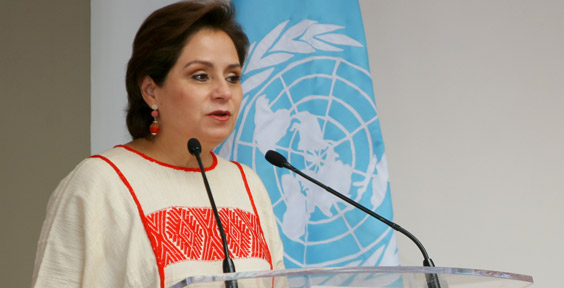National planning, finance and markets are receiving on-the-ground support from UN Climate Change Regional Collaboration Centres (RCCs) and their diverse partners working towards implementation of the Paris Climate Change Agreement.

On the margins of the climate talks that concluded in Bonn, Germany on Thursday, May 10, 2018, delegates and observers learned about several regional initiatives, including the NDC Partnership’s cooperation with RCC Panama and its engagement with 71 countries and some 19 organisations and institutions to further the goals of the Paris Agreement.
In 2015 in Paris, countries committed to limiting global temperature rise to 2 degrees Celsius and to work towards the safer target of 1.5 degrees Celsius. Countries submit and are expected to periodically enhance documents describing their national climate action plans (Nationally Determined Contributions, or “NDCs”) to achieving the goals of the agreement.
The purpose of the NDC Partnership is to “mobilise support and achieve ambitious climate goals while achieving sustainable development,” by facilitating information development and sharing, technical support and capacity-building, and sourcing of financial support, said Cayetano Casado, NDC Partnership specialist for Latin America and the Caribbean based at RCC Panama.
UN Climate Change established five RCCs with prominent partners to promote the Clean Development Mechanism (CDM) on the ground in Lomé, Togo, for West Africa; Kampala, Uganda, for East Africa; Bangkok, Thailand, for Asia and the Pacific; Panama City, Panama, for Latin America; and St. George’s, Grenada, serving the Caribbean. With the CDM, at their core, the RCCs now support a broad range to global climate action for implementing the Paris Agreement.
Under the CDM, projects in developing countries earn a saleable credit for each tonne of greenhouse gas they reduce or avoid. The incentive has led to the registration of more than 8,100 projects and programmes in 111 countries and the issuance of more than 1.9 billion CERs. Each CER is equivalent to one tonne of carbon dioxide reduced or avoided.
Tackling climate change will take a great deal of resources, so green finance is a key focus of work in the RCCs, said Massamba Thioye, a manager at UN Climate Change who works to “facilitate developing countries’ access to green finance.”
“The Paris Agreement is a development agreement; it’s not just about emission reductions,” said Mr. Thioye. “Projects are there, and we know finance is available.”
Through the RCCs, Mr. Thioye works to encourage financiers to align their lending with the goals of the Paris Agreement, and he helps build capacity in developing countries to access finance through projects that can show more attractive “risk and return.”
The “green finance framework initiative” has begun in Africa, with a framework in place in Zimbabwe, and is on its way to Latin-America and Caribbean and Asia, via planned Green Investment Catalyst Roundtables.
Others are looking at carbon pricing and market approaches to incentivize emissions reductions and investment, among them K. Suresh, Director of the Climate Change Programme Department in Singapore’s National Environment Agency.
As Chair of the Working Group on Climate Change of the Association of Southeast Asian Nations (ASEAN), Mr. Suresh leads ASEAN’s collaboration with RCC Bangkok on the Collaborative Instruments for Ambitious Climate Action project, designed to explore and support market instruments capable of driving action at the national level while laying the foundation for broader cooperation in the form of a possible regional carbon market.
Measurement, reporting and verification (MRV) is the first step in a country’s move to carbon pricing and use of market approaches, said, Mr. Suresh.
Those at the event in Bonn also learned details of the West African Alliance on Carbon Markets and Climate Finance from Sandra Greiner, Lead Consultant at the advisory company and think tank Climate Focus. The Alliance fosters participation of West African delegates in the UN Climate Change process, promotes access to market mechanisms and climate finance, and will pilot the transition of CDM-related capacities and activities in the context of the Paris Agreement.
“RCC Lomé has from the beginning been an invaluable partner, contributing expertise,” said Ms. Greiner.
Badacar Sarr, General Manager of ENERTEC-SARL, based in Dakar, Sengal, provided a briefing on the West African South-South Network on MRV and Transparency.
“Our vision is to have operational MRV systems by 2020 in the ECOWAS [Economic Community of West African States] countries engaged in this initiative,” said Mr. Sarr. To date, 14 countries have joined the initiative and have or will benefit from knowledge sharing, best-practices workshops on MRV and transparency, and capacity-building.
The RCCs support national climate action through capacity-building, technical assistance and strategic networking – sourcing know-how and resources to drive clean development.
